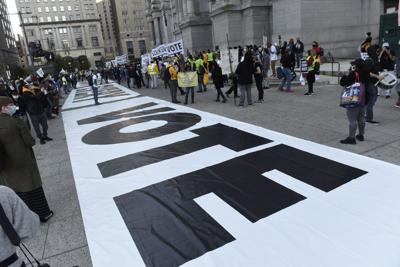We’ve heard just about every excuse imaginable for not voting:
I’m too busy.
The day/time isn’t convenient.
The voting times are during my workday.
I don’t know where to vote.
I forgot.
I don’t know enough about the candidates or issues.
My vote doesn’t count.
Today, we face decisions on U.S. senator, governor, lieutenant governor, U.S. representative, state senator, state representative as well as four ballot questions.
There will also be a special election to fill the 6th District City Council seat vacated by Bobby Henon after he was convicted on federal corruption charges. That district represents Philadelphia’s river wards and part of the lower Northeast.
If you ever think that just one vote cannot make much of a difference, consider some of the closest elections in U.S. history.
In 2000, Al Gore narrowly lost the Electoral College vote to George W. Bush. The election came down to a recount in Florida, where Bush had won the popular vote by such a small margin that it triggered an automatic recount and a Supreme Court case (Bush v. Gore). In the end, Bush won Florida by 0.009% of the votes cast in the state, or 537 votes. Had 600 more pro-Gore voters gone to the polls in Florida that November, there may have been an entirely different president from 2000 to 2008.
More recently, Donald Trump defeated Hillary Clinton in 2016 by securing a close Electoral College win. Although the election did not come down to a handful of votes in one state, Trump’s votes in the Electoral College decided a tight race. Clinton won the national popular vote by nearly 3 million votes, but the high number of Trump voters in key districts in “swing” states like Pennsylvania, Wisconsin and Michigan helped seal enough electoral votes to win the presidency.
According to the Office of the Philadelphia City Commissioners, just 17% of eligible voters turned out in Philadelphia for 2018’s primary election. That figure is similar to a Portland State University study that found nationally that fewer than 15% of eligible voters were turning out to vote for mayors, council members and other local offices. Low turnout means that important local issues are determined by a limited group of voters, making a single vote even more statistically meaningful.
If you’re 18 or older, you have no excuse not to participate. Participating in elections is one of the key freedoms of American life. Many people in countries around the world do not have the same freedom. No matter what you believe or whom you support, get rid of all of the excuses and exercise your right to vote.
If you’re African American, you really have no excuse. Many Americans protested, marched, were arrested and even died for voting equality. If you don’t vote, then you’re actually supporting those who you may not want to represent you in elective offices.
As legendary civil rights leader and congressman John Lewis said, “The right to vote is precious, almost sacred. It is the most powerful nonviolent tool or instrument in a democratic society. We must use it.”
Vote because it’s the right thing to do.







(0) comments
Welcome to the discussion.
Log In
Keep it Clean. Please avoid obscene, vulgar, lewd, racist or sexually-oriented language.
PLEASE TURN OFF YOUR CAPS LOCK.
Don't Threaten. Threats of harming another person will not be tolerated.
Be Truthful. Don't knowingly lie about anyone or anything.
Be Nice. No racism, sexism or any sort of -ism that is degrading to another person.
Be Proactive. Use the 'Report' link on each comment to let us know of abusive posts.
Share with Us. We'd love to hear eyewitness accounts, the history behind an article.